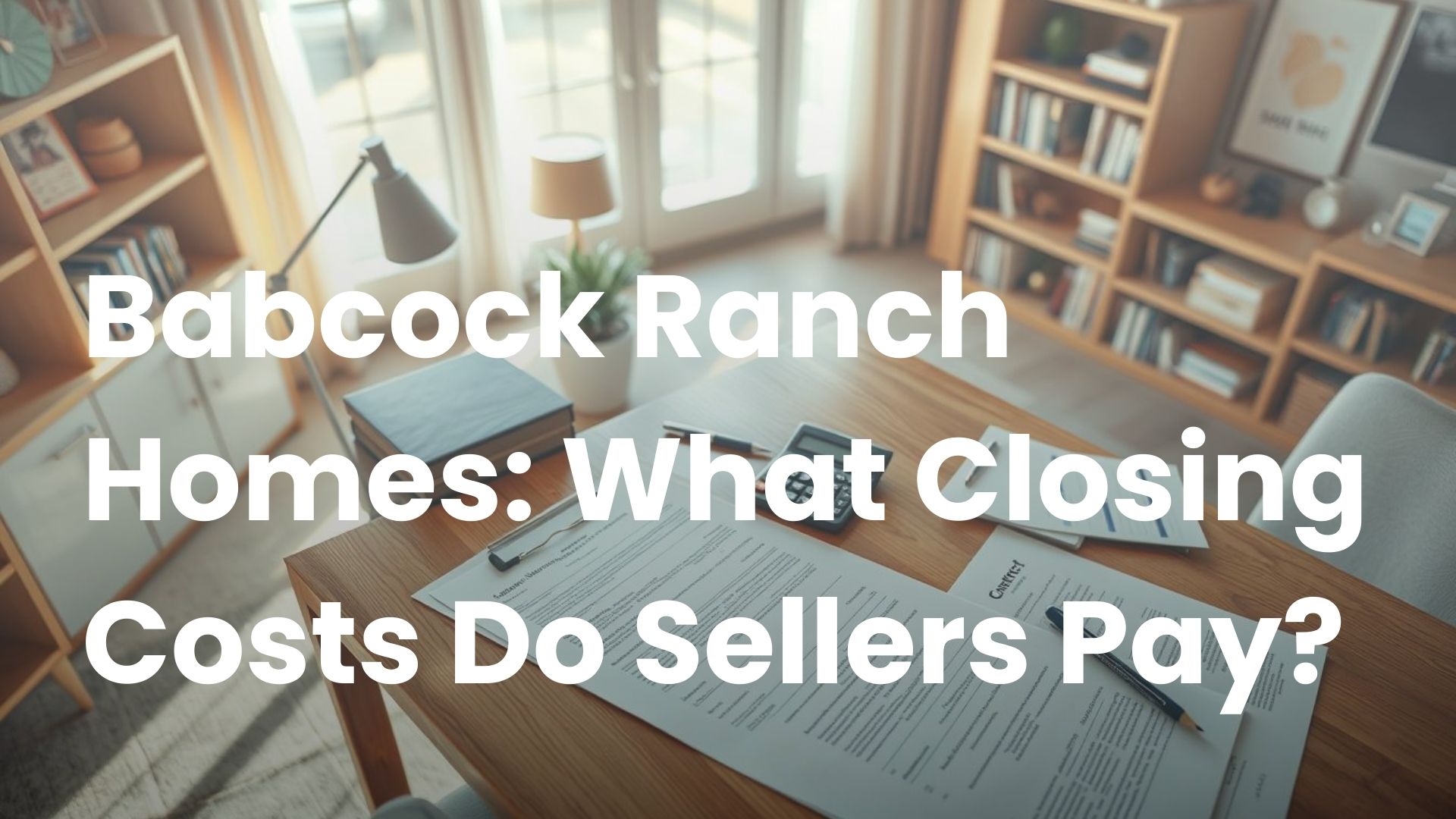 When selling property in Babcock Ranch, Florida, understanding financial obligations is critical. Closing costs are fees paid during the final stages of a real estate transaction. These expenses cover services like title transfers, legal documentation, and administrative tasks. Sellers often shoulder specific responsibilities, which can impact their net proceeds.
When selling property in Babcock Ranch, Florida, understanding financial obligations is critical. Closing costs are fees paid during the final stages of a real estate transaction. These expenses cover services like title transfers, legal documentation, and administrative tasks. Sellers often shoulder specific responsibilities, which can impact their net proceeds.
Freddie Mac reports that seller closing costs typically range between 1% and 3% of the home’s sale price. CoreLogic data highlights title insurance and prorated property taxes as common fees. At Babcock Ranch Homes, experts simplify these details to help sellers prepare financially. This guide focuses exclusively on seller-related expenses to ensure clarity.
Title insurance, for example, protects against ownership disputes and is standard in most transactions. Seller concessions, such as covering inspection repairs, may also arise. While buyers and sellers split costs in many cases, this article zeroes in on what sellers should anticipate.
Babcock Ranch Homes, located in Florida, offers tailored guidance for navigating real estate sales. With a focus on transparency, their team ensures clients grasp every fee. For personalized assistance, call 518-569-7173 to discuss your unique situation.
Key Takeaways
- Seller closing costs average 1-3% of the home’s sale price.
- Title insurance and prorated taxes are common seller expenses.
- Concessions, like repair credits, may reduce net profits.
- Costs vary by location and transaction complexity.
- Babcock Ranch Homes provides expert support for sellers.
Introduction to Seller Closing Costs
Navigating real estate transactions requires clarity, especially when preparing for the final steps of a sale. This guide simplifies the complexities sellers face, focusing on key financial responsibilities tied to transferring property ownership. By breaking down each phase, Babcock Ranch Homes ensures you stay informed and confident throughout the process.

Purpose of the Guide
Real estate transactions involve numerous details, from paperwork to negotiations. This resource exists to demystify seller obligations, providing actionable insights into fees tied to title transfers, legal services, and administrative tasks. As one Babcock Ranch agent notes:
“Knowledge is power in real estate—understanding costs upfront prevents surprises later.”
Overview of the Home Selling Process
Estate agents play a pivotal role in guiding sellers through listing, marketing, and negotiations. Once an offer is accepted, a title search verifies legal ownership—a standard step to avoid disputes. These checks often uncover liens or zoning issues that must be resolved before proceeding.
Most transactions follow a structured timeline:
- Listing preparation and pricing strategy
- Reviewing offers and negotiating terms
- Completing inspections and repairs
- Finalizing documentation and transferring funds
Babcock Ranch Homes emphasizes transparency, ensuring sellers grasp how fees align with each stage. With median Florida home prices rising 4% annually (Florida Realtors®), precise financial planning becomes essential. Their team offers tailored support, turning complex jargon into clear next steps.
Exploring What Closing Costs Do Sellers Pay
Financial obligations vary significantly between parties in property sales. Industry data reveals distinct patterns: CoreLogic reports sellers typically cover 1.5-3% of the sale price in transaction-related expenses, while buyers handle larger sums tied to financing.

Breaking Down Transaction Fees
Closing expenses encompass payments required to finalize ownership transfers. These include title searches, legal documentation, and administrative services. Freddie Mac notes sellers often pay for:
- Title insurance (averaging 0.5% of sale price)
- Prorated property taxes
- Transfer taxes in 34 states
Divergence in Financial Commitments
While buyers focus on mortgage origination fees and appraisal costs, sellers face different priorities. A $400,000 home sale could result in $8,000-$12,000 in seller expenses. Loan-related charges generally fall to buyers, though market conditions sometimes shift this balance.
One industry expert explains:
“The party responsible for specific fees often depends on local customs and negotiation leverage.”
Understanding these distinctions helps prevent last-minute surprises. For instance, escrow services might cost $500-$2,000, typically split between both parties. Babcock Ranch professionals emphasize reviewing all line items early to align expectations with reality.
Common Components of Seller Closing Costs
Selling a home involves several standard expenses tied to legal and administrative requirements. Three key areas dominate these obligations: transfer taxes, title protections, and escrow services. Understanding each helps sellers budget accurately and avoid delays.
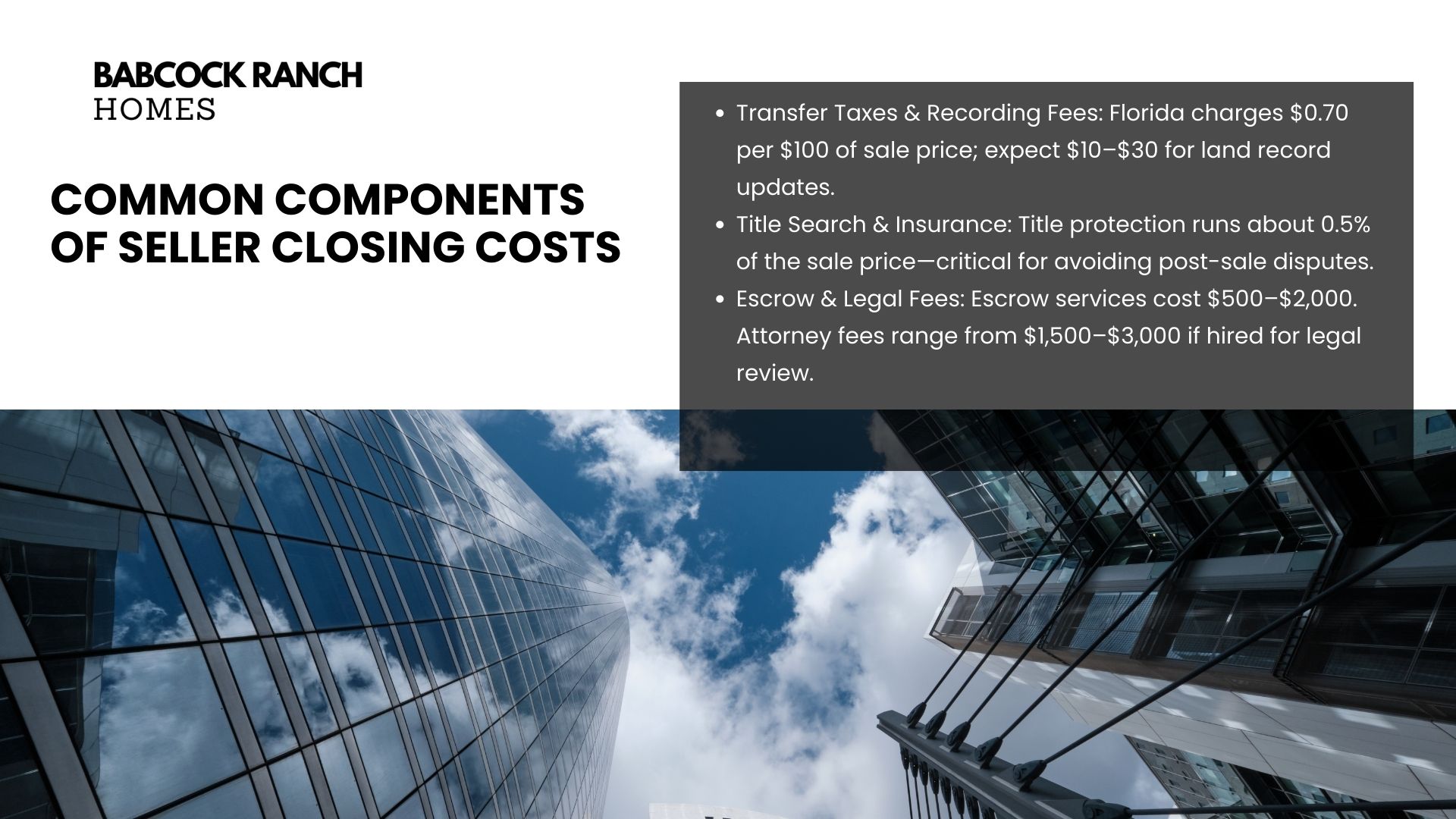
Transfer Taxes and Recording Fees
Local governments often charge transfer taxes when ownership changes hands. In Florida, this averages $0.70 per $100 of the sale price. Recording fees, typically $10-$30, cover updating public land records. These costs ensure the transaction complies with state regulations.
Title-Related Expenses and Insurance
A title search verifies legal ownership and uncovers liens or claims. Most transactions require title insurance, protecting against future disputes. Policies cost roughly 0.5% of the sale price. As one Southwest Florida attorney notes:
“Overlooking a lien during a title search can derail a sale—insurance offers critical peace of mind.”
| Fee Type | Purpose | Typical Cost |
|---|---|---|
| Transfer Tax | State/local ownership transfer | $0.70 per $100 (FL) |
| Title Insurance | Ownership dispute protection | 0.5% of sale price |
| Escrow Services | Secure fund handling | $500-$2,000 |
Escrow and Attorney Fees
Escrow agents manage funds and documents until closing, charging $500-$2,000 depending on complexity. Florida law doesn’t require attorney involvement, but many sellers hire one ($1,500-$3,000) to review contracts. These professionals ensure compliance with disclosure laws and streamline paperwork.
Real Estate Agent Commissions and Associated Fees
Agent commissions significantly influence seller profits in real estate transactions. These fees, traditionally covered by sellers, compensate both the listing agent and buyer’s representative. Understanding their structure helps sellers gauge net proceeds accurately.
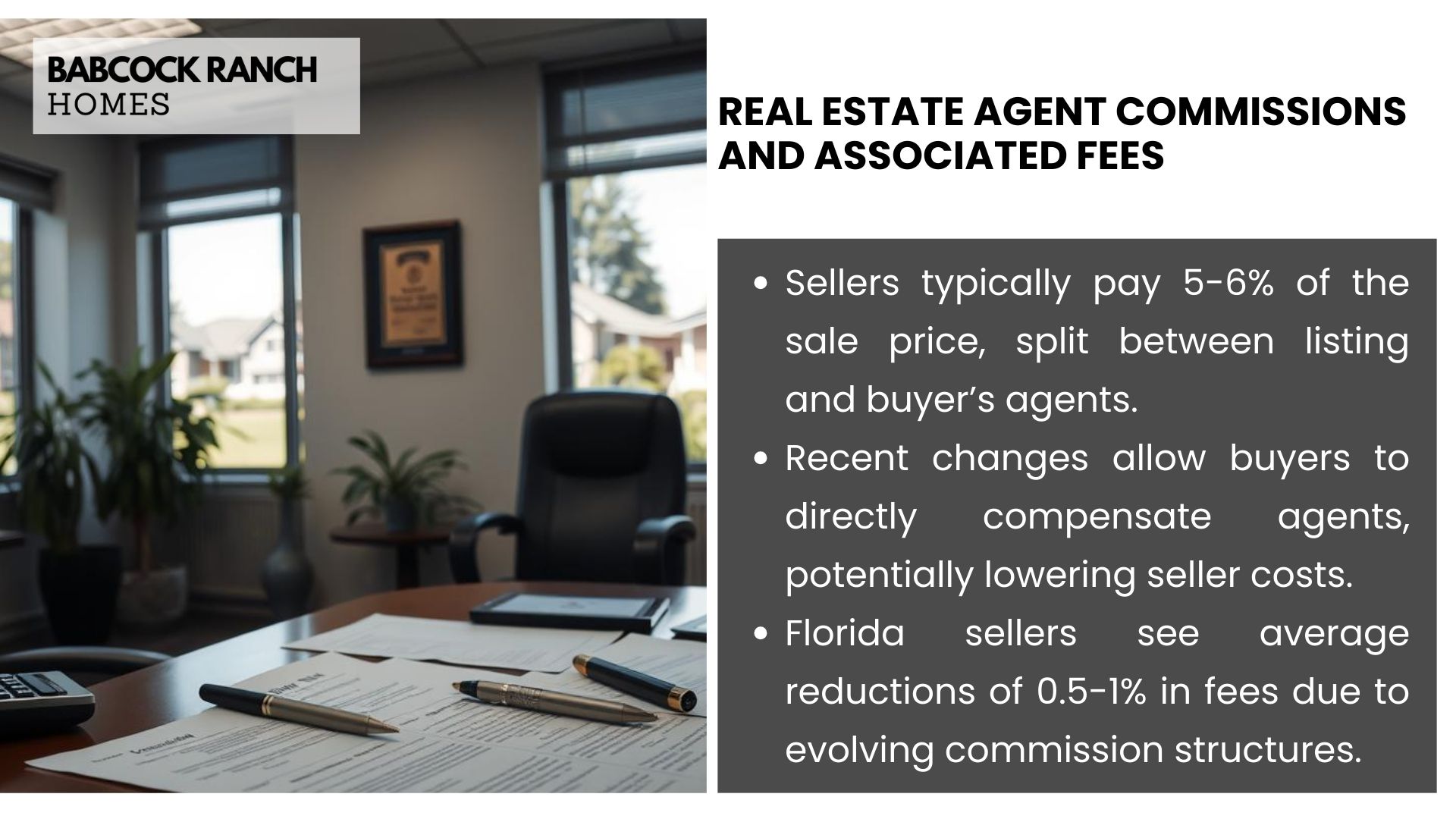
Understanding Listing and Buyer’s Agent Commissions
Historically, sellers pay 5-6% of the sale price, split between agents. For a $400,000 home, this equals $20,000-$24,000. This arrangement stems from cooperative practices between brokerages to attract buyer interest. Recent lawsuits, however, challenge this model.
- Listing agents typically receive 2.5-3%
- Buyer’s agents earn 2.5-3%
- Total commission reduces seller’s final amount
Impact of Recent Regulatory Changes
2023’s National Association of Realtors® settlement reshaped commission negotiations. Buyers may now directly compensate agents through written agreements. This shift could lower seller expenses but requires careful planning.
- Buyer-agent agreements clarify payment terms upfront
- Commission flexibility increases in competitive markets
- Florida sellers see average reductions of 0.5-1% in fees
A Tampa broker observes:
“Transparency in fee discussions is now non-negotiable—sellers need precise breakdowns.”
Adjusting to these changes helps sellers retain more equity. Babcock Ranch Homes advisors recommend reviewing contracts early to align expectations with current standards.
Local Regulations and the Florida Market Impact
Florida’s real estate landscape features distinct rules that shape seller expenses. In Babcock Ranch, regional policies and community standards add layers to typical transaction costs. Let’s explore how local frameworks influence financial planning for property transfers.
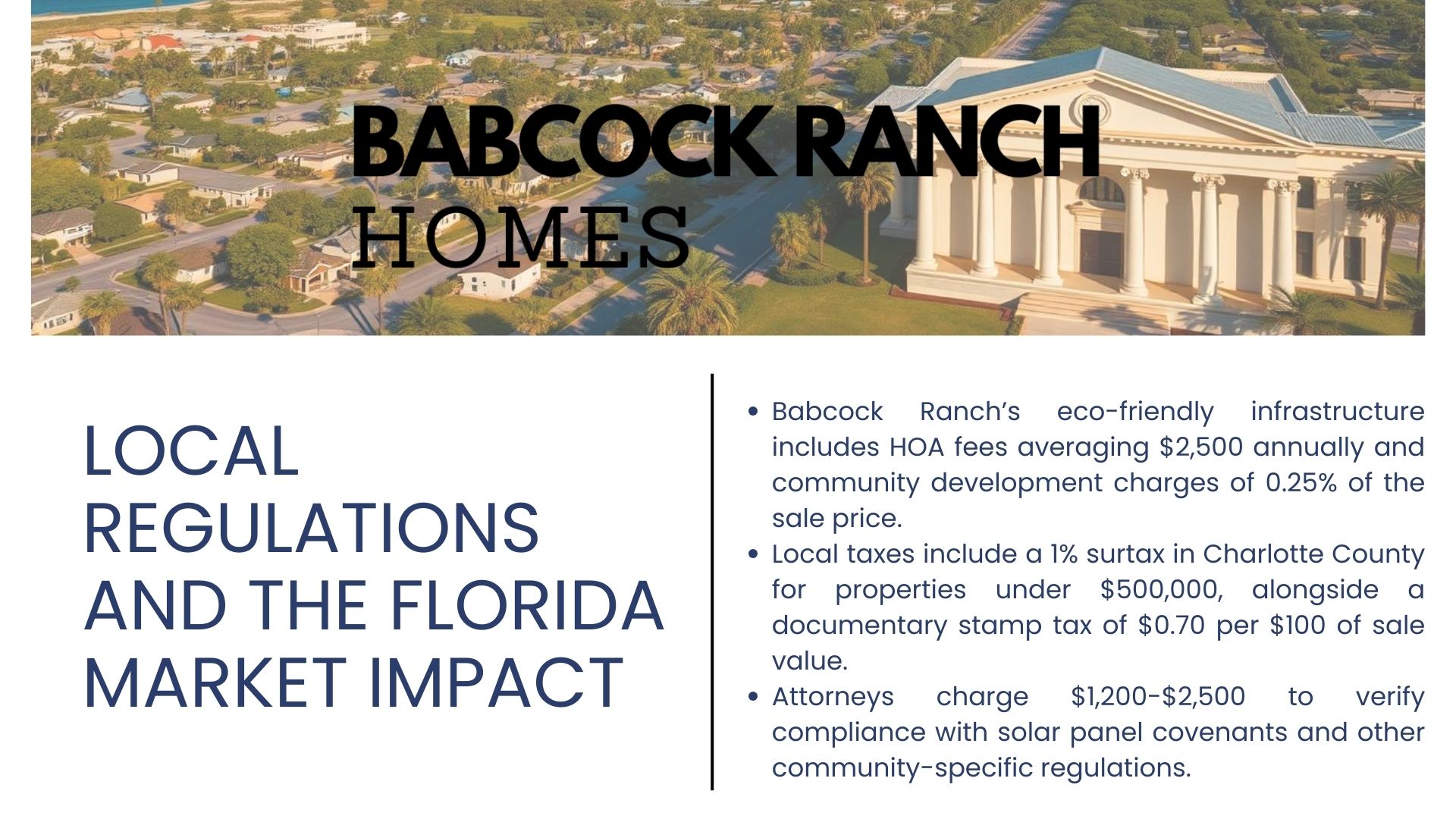
Fees Specific to Babcock Ranch, Florida
This eco-conscious community includes unique fees tied to its sustainable infrastructure. For example:
- HOA contributions: Annual fees averaging $2,500 support solar-powered utilities
- Environmental compliance checks: $300-$500 for stormwater system inspections
- Community development charges: 0.25% of sale price funds green space maintenance
| Fee Type | Babcock Ranch | Florida Average |
|---|---|---|
| Transfer Tax | $0.75 per $100 | $0.70 per $100 |
| Title Search | $600 | $450 |
| HOA Documentation | $200 | $150 |
State and Local Tax Considerations
Florida lacks state income tax but imposes documentary stamp taxes on deeds—$0.70 per $100 of sale value. Charlotte County adds a 1% local surtax for properties under $500,000. Sellers can negotiate concessions like temporary tax rate locks during slower markets.
A Babcock Ranch agent advises:
“Review tax proration dates carefully—Florida’s March 31 assessment cutoff impacts who pays what.”
Attorneys here often charge $1,200-$2,500 to verify compliance with solar panel covenants. Partnering with agents familiar with green community rules helps avoid penalties. Always request itemized tax estimates during contract reviews.
Mortgage Payoff and Loan-Related Expenses
Finalizing a property sale involves more than just transferring ownership—it requires settling existing financial commitments. Sellers must clear outstanding mortgage balances before completing the deal. This process often includes fees beyond the principal amount owed, impacting final proceeds.
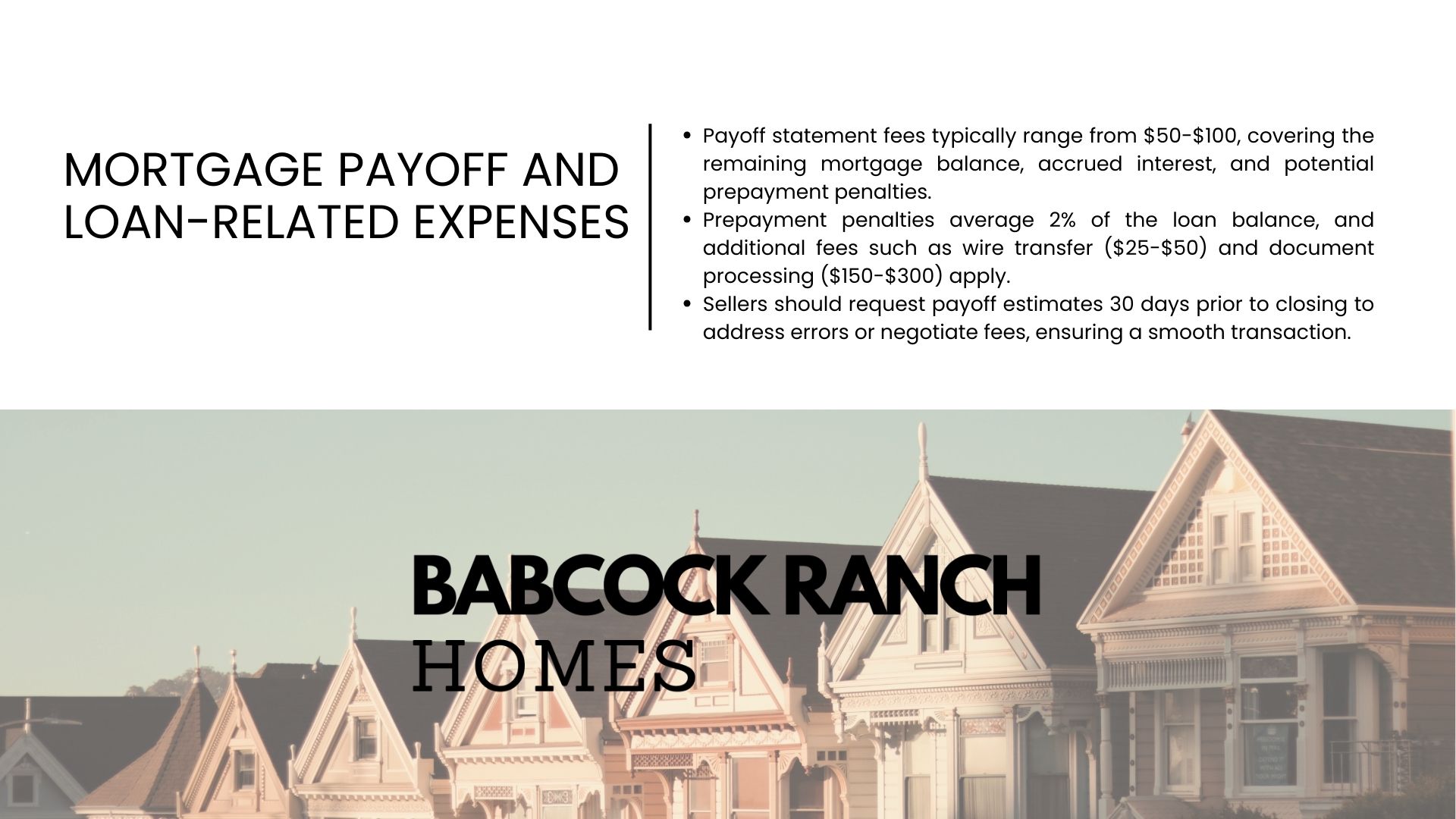
Paying Off Existing Mortgages
Lenders typically charge a payoff statement fee ($50-$100) to calculate the exact amount due. This figure includes remaining principal, accrued interest, and potential prepayment penalties. Freddie Mac reports 15% of conventional loans carry early repayment fees averaging 2% of the balance.
Additional Loan-Related Closing Costs
Wire transfer fees ($25-$50) and document processing charges ($150-$300) add up quickly. Some lenders require final inspections ($200-$400) to confirm property condition. A Southwest Florida financial advisor notes:
“Review your mortgage terms early—unexpected fees can reduce proceeds by 1-2% if unaccounted for.”
| Fee Type | Description | Average Cost |
|---|---|---|
| Prepayment Penalty | Early loan repayment charge | 2% of balance |
| Processing Fee | Document handling | $150-$300 |
| Wire Transfer | Fund dispersal | $25-$50 |
Smart sellers request payoff estimates 30 days before the purchase agreement finalizes. This allows time to dispute errors or negotiate fees. Transfer taxes and prorated property taxes also factor into calculations, requiring precise coordination between lenders and title companies.
Strategies to Negotiate and Reduce Seller Closing Costs

Smart financial planning goes beyond calculating fees—it involves strategic negotiations to preserve equity. Owners can often shift portions of transaction expenses through creative deal structuring. For example, a Tampa seller recently saved $3,000 by requesting a 1% commission reduction from their real estate agent when listing a $350,000 property.
Mastering Cost-Sharing Conversations
In balanced markets, buyers may agree to cover specific fees like title searches or recording charges. A 2023 Florida Association of Realtors® study found 22% of transactions included buyer-paid transfer taxes. Presenting comparable sales data strengthens negotiation positions. As one Babcock Ranch broker advises:
“Frame concessions as partnership-building—highlight how shared costs keep deals moving forward.”
Optimizing Concession Opportunities
Seller concessions work best when aligned with buyer priorities. Offering to fund HOA dues for six months ($1,500) instead of lowering the price maintains property value perception. Consider these approaches:
| Strategy | Potential Savings | Market Fit |
|---|---|---|
| Buyer-paid title insurance | $1,750 | Competitive listings |
| Split escrow fees | $600 | Mid-priced homes |
| Prepaid property taxes | Variable | High-demand areas |
Always compare service provider quotes. Title companies in Southwest Florida show 15% price variations for identical policies. Owners who negotiate inspection credits rather than repairs often retain more control over timelines. Understanding local tax assessment cycles helps time concessions effectively.
Final Considerations for Maximizing Net Proceeds
Maximizing profits from a property sale demands strategic preparation and attention to detail. Reviewing every line item in the closing disclosure helps identify discrepancies early. Experts recommend allocating 2-3% of the sale price as a buffer for unexpected fees.
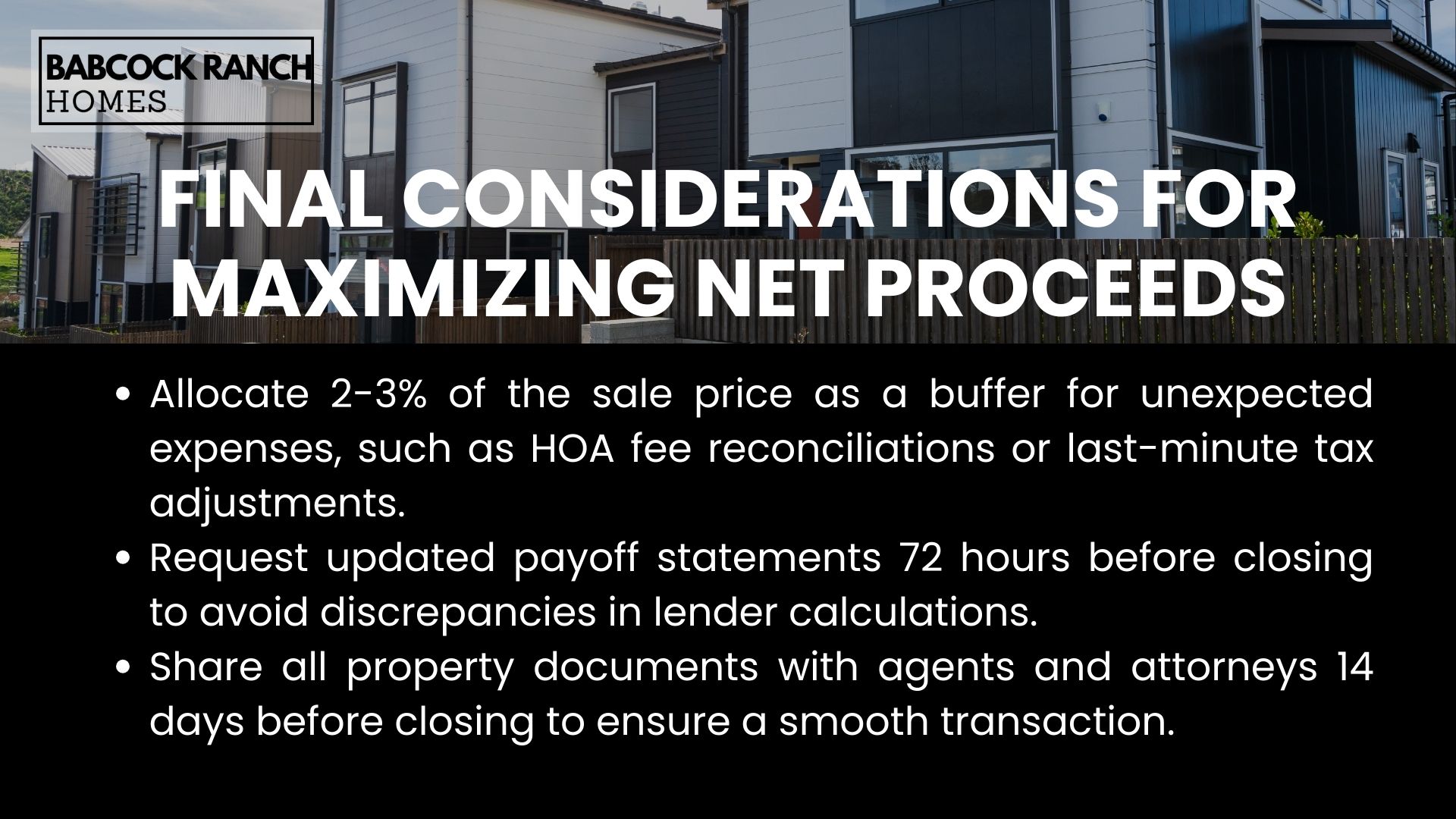
Budgeting for Unexpected Expenses
Start by comparing estimated charges with the final settlement statement. Common oversights include:
- Last-minute adjustments to prorated property taxes
- HOA fee reconciliations exceeding initial quotes
- Additional notary or courier services
A Southwest Florida title agent advises:
“Always request updated payoff statements 72 hours before closing—lender calculations sometimes change.”
| Budget Category | Planned | Actual |
|---|---|---|
| Attorney Fees | $2,000 | $2,150 |
| Title Updates | $600 | $725 |
| Miscellaneous | $500 | $300 |
Steps to Ensure a Smooth Transaction
Follow these practices to maintain momentum:
- Share all property documents with agents and attorneys 14 days pre-closing
- Confirm wire transfer details with financial institutions
- Schedule final walkthroughs during business hours
Aligning timelines prevents delays that could impact the home sale timeline. For complex cases, consider escrow holdbacks to cover cost overruns without renegotiating the sale price.
Conclusion
Successfully navigating property sales demands awareness of financial commitments tied to ownership transfers. Transfer taxes, agent commissions, and title-related fees often shape seller obligations. These expenses vary depending on regional policies, negotiated terms, and property value—highlighting the need for tailored planning.
Babcock Ranch Homes simplifies this complexity through transparent guidance. Their experts clarify how local regulations impact costs, from fluctuating transfer taxes to flexible commission structures. Data shows fees can shift by thousands between markets, making professional insights invaluable during a home purchase journey.
Key strategies empower sellers to maximize proceeds. Understanding what sellers pay enables smarter negotiations, while early consultations prevent budget surprises. Whether managing prorated taxes or navigating title insurance, informed decisions start with reliable support.
Ready to optimize your sale? Babcock Ranch Homes offers personalized solutions to streamline transactions. Call 518-569-7173 today—their team ensures you close confidently, equipped with precise knowledge and strategic advantages.
FAQ
How do seller closing costs differ from buyer expenses?
What title-related fees should sellers expect?
Are real estate commissions negotiable?
Does Babcock Ranch, Florida, have unique seller fees?
How do seller closing costs differ from buyer expenses?
What title-related fees should sellers expect?
Are real estate commissions negotiable?
Does Babcock Ranch, Florida, have unique seller fees?
FAQ
How do seller closing costs differ from buyer expenses?
Sellers typically cover costs tied to transferring ownership, like transfer taxes and agent commissions. Buyers usually pay fees related to financing, inspections, and lender requirements. Both parties split some expenses, such as title insurance, depending on local customs.
What title-related fees should sellers expect?
Title search fees, title insurance premiums, and settlement fees are common. These ensure the property’s legal ownership history is clear and protect against future claims. Costs vary by state but often total 0.5%–1% of the sale price.
Are real estate commissions negotiable?
Yes. Agent commissions are typically 5%–6% of the sale price but can sometimes be negotiated, especially in competitive markets. Recent legal shifts, like the NAR settlement, may also influence how commissions are structured moving forward.
Does Babcock Ranch, Florida, have unique seller fees?
Florida sellers pay documentary stamp taxes (
FAQ
How do seller closing costs differ from buyer expenses?
Sellers typically cover costs tied to transferring ownership, like transfer taxes and agent commissions. Buyers usually pay fees related to financing, inspections, and lender requirements. Both parties split some expenses, such as title insurance, depending on local customs.
What title-related fees should sellers expect?
Title search fees, title insurance premiums, and settlement fees are common. These ensure the property’s legal ownership history is clear and protect against future claims. Costs vary by state but often total 0.5%–1% of the sale price.
Are real estate commissions negotiable?
Yes. Agent commissions are typically 5%–6% of the sale price but can sometimes be negotiated, especially in competitive markets. Recent legal shifts, like the NAR settlement, may also influence how commissions are structured moving forward.
Does Babcock Ranch, Florida, have unique seller fees?
Florida sellers pay documentary stamp taxes ($0.70 per $100 of sale price) and may face local transfer fees. Babcock Ranch’s community-specific charges, like HOA transfer fees, could also apply. Consult a local agent for precise estimates.
How do existing mortgages affect closing costs?
Sellers must pay off their remaining loan balance at closing, including any prepayment penalties. Lenders may charge processing fees to release the lien, which are deducted from the sale proceeds before the seller receives payment.
Can sellers reduce closing costs through concessions?
Yes. Offering concessions, like covering a portion of the buyer’s fees, can help close deals faster. Negotiate with service providers (e.g., title companies) for discounted rates, and clarify which costs buyers might split in the contract.
What unexpected expenses should sellers budget for?
Repairs requested after inspections, prorated property taxes, or delayed closing penalties can arise. Set aside 1%–3% of the sale price as a buffer. A real estate attorney or agent can help anticipate region-specific surprises.
How do existing mortgages affect closing costs?
Can sellers reduce closing costs through concessions?
What unexpected expenses should sellers budget for?
.70 per 0 of sale price) and may face local transfer fees. Babcock Ranch’s community-specific charges, like HOA transfer fees, could also apply. Consult a local agent for precise estimates.
How do existing mortgages affect closing costs?
Sellers must pay off their remaining loan balance at closing, including any prepayment penalties. Lenders may charge processing fees to release the lien, which are deducted from the sale proceeds before the seller receives payment.
Can sellers reduce closing costs through concessions?
Yes. Offering concessions, like covering a portion of the buyer’s fees, can help close deals faster. Negotiate with service providers (e.g., title companies) for discounted rates, and clarify which costs buyers might split in the contract.
What unexpected expenses should sellers budget for?
Repairs requested after inspections, prorated property taxes, or delayed closing penalties can arise. Set aside 1%–3% of the sale price as a buffer. A real estate attorney or agent can help anticipate region-specific surprises.




















